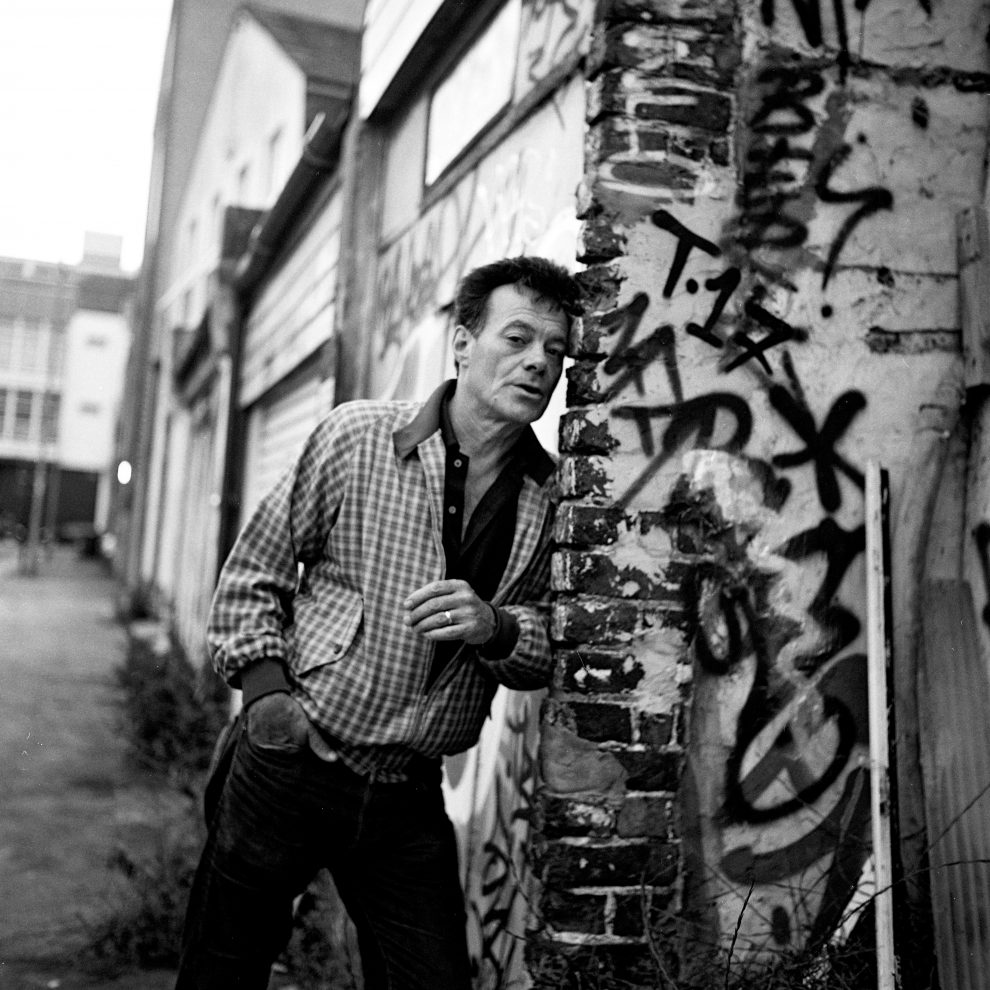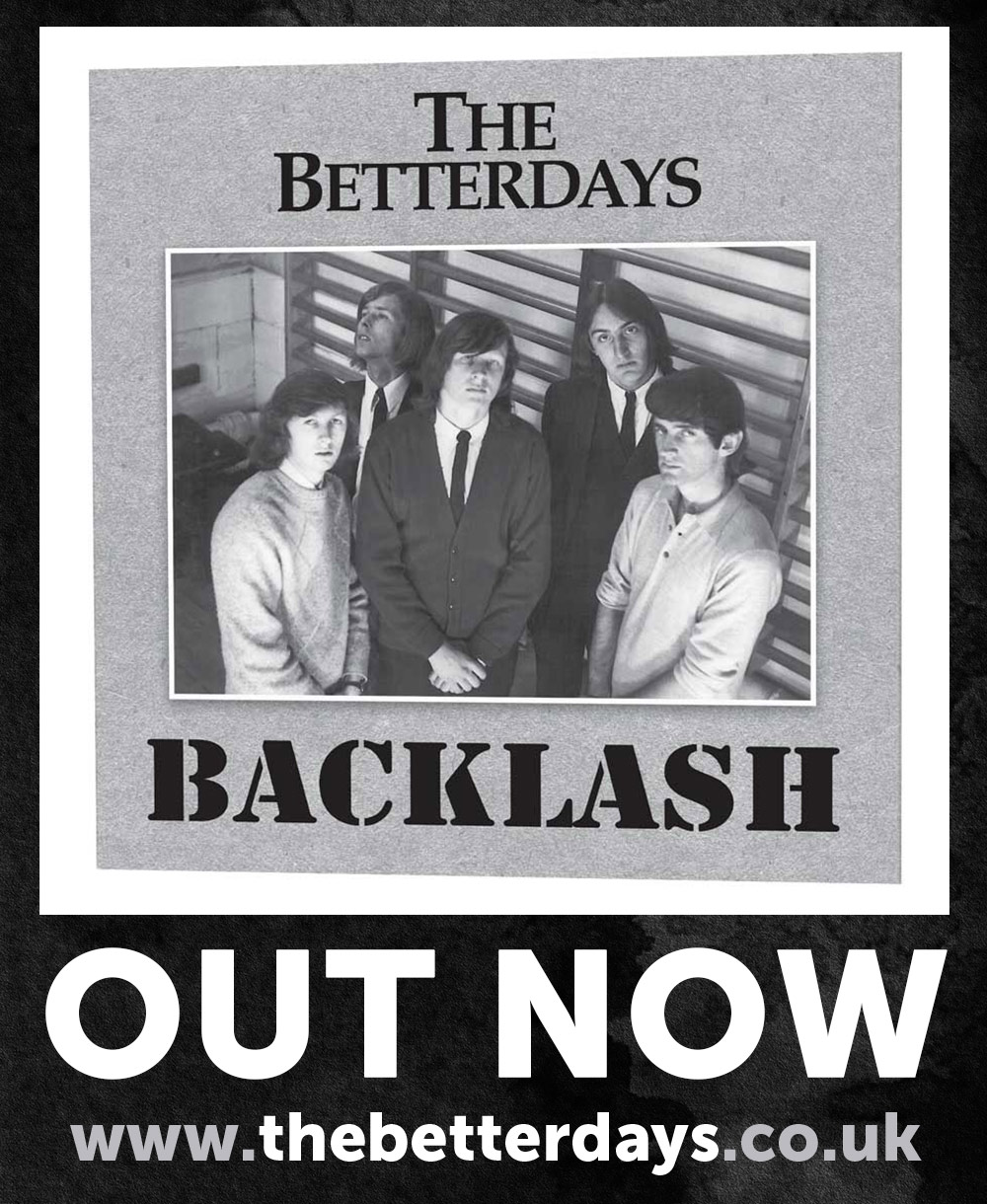Cop a load of that headline folks. A very brave man – considering his American missus is stood behind him and in arm’s reach of several heavy, blunt items in their Brighton home!
The Essex-born soul and r&b star dramatically lifts the lid on his domestic situation, during a chat about his stunning new album, “Whatever It Takes”. Simon Redley dons his hard hat!
Now I have your attention with that teasing tabloid style headline and intro’ to this piece, before we dive into the “kiss and tell” stuff, let’s start by turning the spotlight on to the new album.
As regards any possible differences between the latest record and the previous release on the US Daptone label, 2016’s “Hold On”, James opens up. “The basic concept was just the same; the best songs I could write. No higher concept behind than that; I just wrote the best songs I could write.
“Because I’m not an albums’ bloke, I just see an album as a collection of songs, you know. Some Q & A I was given, asked me to name five of my favourite albums; but I just have my favourite tracks.
“I come from that school of thought. The way it might have developed; some of the posher songs have got a but posher and the wilder ones have got a bit wilder. Yeah, some of the songs came out sounding a bit posher than previously”. I think for “posh” see “sophisticated”.
James picks out the title cut as his current favourite from the new record, because it goes down well with people outside his usual sphere of music – people who aren’t necessarily into r&b or soul music. Folk who are not tied to just one genre.
The James Hunter Six recently did a handful of UK shows opening for ex- Beautiful South stars Paul Heaton and Jacqui Abbot, and James noticed that one song in their set, “Whatever It Takes” got a better reaction than most of the others.
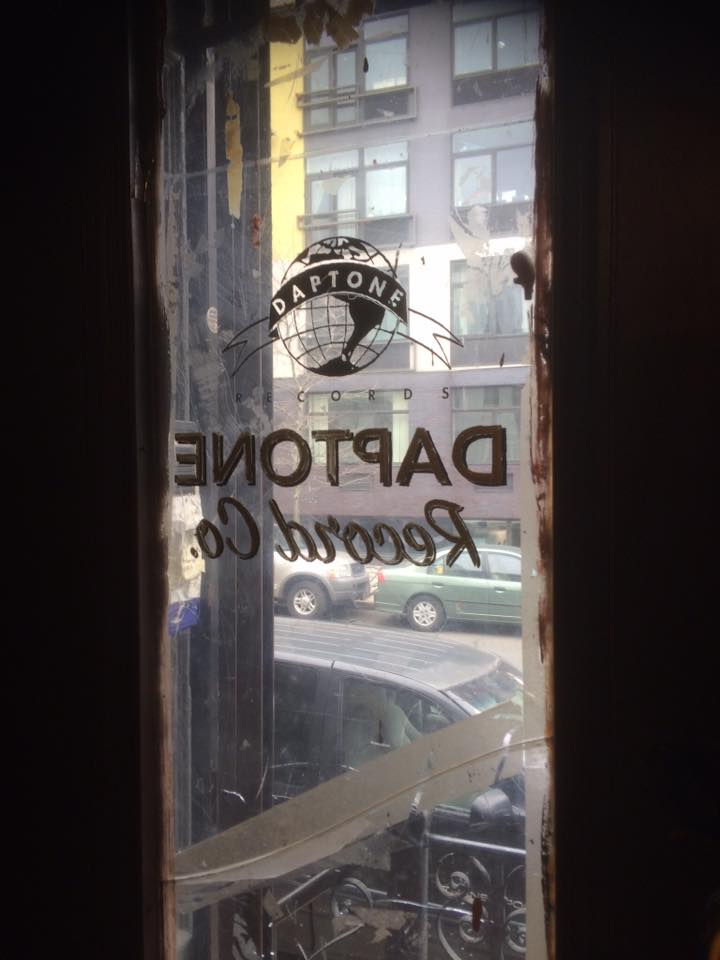
The New York-based Daptone label lost their two biggest stars in recent times; when “The Screaming Eagle Of Soul” Charles Bradley and Soul Queen Sharon Jones, both passed away.
James speaks highly of his current record label home. “Probably the first time we have been with a label that totally gets what we are about.
“Some of the previous ones we had when we first got notoriety; if one album wouldn’t sell they would try and get me to re-evaluate the whole concept of what I was doing.
“You know, I wasn’t up for that; we had all kinds of suggestions. But Daptone really let us get on with it, because they know what we are getting at with our music and artistically.
“Some of the suggestions from previous labels, included changing the entire line-up and getting a lot of trumpets in. Yeah, really.
“That idea of, ‘oh, it didn’t work with this line-up, try another one’…. I don’t think further suggestions were made with any knowledge of what caused the album not to sell as much as they’d like.
“It’s just, ‘throw enough shit and see what sticks’. Whereas really, I think better promotion might have done it!
“Daptone understand what we are about: Soul music with a certain feel, a kind of style that fell out of favour quite a few years ago, and I never knew why that style didn’t stay the distance as long as it could have.
“I write music with the kind of feel that really speaks to me, and it’s not getting on any sort of temporary fad. Some people used to see music as a bit of a fashion accessory. I’ve never been into that type of thinking”.
So, is it a battle to not sound too retro or ‘copy-cat’ of the old school soul and r&b artists when you record and write?
“I do try and make it as original as I can. But I never feel as though I have to be loyal to a style of music. Music is a tool.
“You are not ruled by your style of music, it’s a tool to express yourself. I don’t feel I have to be loyal to it, in order not to hurt its feelings, you know.
‘If at first you don’t succeed, give up!’
“I like to take older clichés and subvert them a little bit; something like all those anthem-y songs; ‘oh don’t give up, you’ll get there in the end’, and I think; well that’s been said to death. So that’s why I wrote ‘Chicken Switch’: ‘If at first you don’t succeed, give up!’. That’s why I want to go against the occasional preachy style that soul music can fall prey to”.
55-year-old James put out four records under his previous moniker of Howling Wilf and The Vee-Jays in the 1980s and 1990, four as a solo artist and three – including the new one – as the James Hunter Six.
Also working live and recording two albums with Van Morrison, a big fan of James’ talents. But after many years of slogging up and down the motorways here and across Europe, the big break came 12 years ago in 2006, with the release of “People Gonna Talk”.
That was his US debut and the first of two albums that reached number one on the Billboard blues chart – also winning him a Grammy nomination for “Best Traditional Blues Album”, Ike Turner eventually beating him to it.
James’ follow-ups, 2008’s “The Hard Way” and then “Minute By Minute”, further cemented Hunter’s reputation as a soul powerhouse, heralded for his talents both as a live performer and as a formidable songwriter.
“Whatever It Takes” is his sixth album since anyone in the USA knew who he was, and the release of the fabulous “People Gonna Talk” – which Rolling Stone magazine said was “a treat not to miss”.
Recorded to tape at Daptone’s Penrose Studios in Riverside, California, with label owner Bosco Mann aka double Grammy winner Gabriel Roth, producing. James has opened on tours for Etta James across the USA and for Aretha Franklin, Tom Petty and Willie Nelson among many other superstars.
Those US gigs originally saw James with a pick-up band over there for economic reasons, but for the last few years he only tours with his long term UK band, who he has always recorded with.
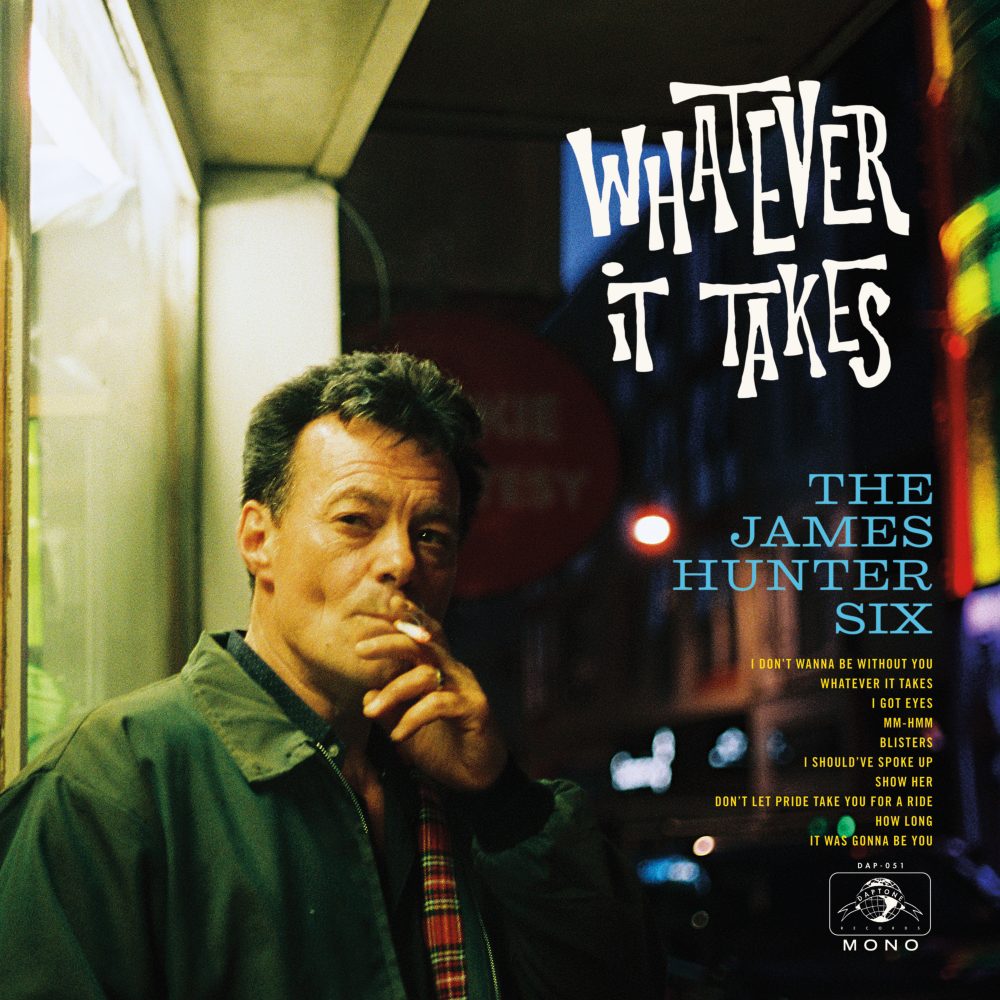
The band features Jonathan Lee on drums; Lee Badau, baritone saxophone; Damian Hand, tenor saxophone; Andrew Kingslow, keyboards/percussion; and Jason Wilson, bass and they have been with James for more than 20 years now.
In October 2011, James sadly lost his wife Jacqueline from cancer. He dedicated his 2013 album “Minute By Minute” to her; the first album credited to The James Hunter Six. Happier times arrived in September 2016, when James married American Jesse Perez Huntsman in New Orleans, as he was about to hit the road for a tour.
It was a small affair with his band, tour manager and the couple attending the register office for the official bit, and then drinks and coffee at a café afterwards. But it was seven months before the pair were able to live together as man and wife over here, waiting for the red tape to be sorted out for Jesse’s UK residency.
There’s nothing as boring as a bloke who’s in love…
The process was very frustrating for Jesse and for James, which prompted him to write the title track to cheer up Jesse, “Whatever It Takes”. There are in fact, three songs on the record dedicated to his new bride. They now live in Brighton, where James has been based for the last five years.
So, has his new marital status and settled home life affected his song writing at all? “Oh, I’ve got really boring since I got married. There’s nothing as boring as a bloke who’s in love, because it’s all soppy love songs now”.
And here it comes…..“She’s ruined me as an artist”, ‘snarls’ James, as both he and Jesse (who is hovering in the background at their Brighton home, as James speaks to me on the ‘phone), belly laugh.
“I used to write all this sardonic, downward looking stuff and now it’s all, ‘ohhh I looove you’, all the kind of songs I would not bother to listen to by anyone else. But I think they’re great because I wrote them, you know what I mean?” chuckles James.
“Yeah, the title track was definitely written trying to cheer her up, during trying to get UK residency. Wild goose chases, everyone telling her different rules. She was really distraught by it and so was I. I was away on tour and polished the song off at a petrol station in the middle of France”.
Jesse first heard James on the radio in a Starbucks coffee shop, back in the USA and fell in love with his voice and songs, determined to go see him in concert. She did, in New York and then a few more times, eventually met him, they became friends and married a year later. Ahhhh.
On previous albums, there has been big nods to Sam Cooke in vocal phrasing perhaps, but he admits that is far less evident this time. “The previous album we did, we had a negative review, by somebody who didn’t like what was exactly what I did like about it. He said, it’s just a load of screaming…Oh good, he noticed….”
Those screams he referenced are the cute shrieks and high-pitched squeals that James innately carries off, in the style of perhaps Little Richard and more aptly, soul singer Dee Clark; one of James’ influences. He also really digs soul man Lou Johnson.
That squeal is born of natural excitement and, James reveals, “showing off for its own sake, because I didn’t used to be able to do that high shriek when I was younger. Now I’ve found my head voice, I give it free reign”.
James is a very under-rated guitar player, but he doesn’t go in for extended solos and showboating, and he tends to use the guitar for brush strokes and colour, rather than a major feature of each track. There is far less guitar on this record, deliberately, but what there is, hits the spot.
“I run out of ideas quite quickly and I tend to do the same little runs here and there. I’m not one for great long solos. The emphasis here is more on the songs, rather than trying to be a blues guitar hero”.
We discuss the number of tracks on the album: 10, all Hunter originals. Compared to those albums that milk it with too many tracks, and some end up being obvious fillers, which one ends up skipping past. All 20 tracks here do it for me. “That’s great…
“The key to that was probably recording fewer tracks,” he responds, tongue firmly in cheek! “Apart from the laziness of not coming up with more songs – it is like pulling teeth for me – it is the length of albums I like to listen to.
“A lot of the previous labels we were with, insisted on length. I think this is a legacy going back to our days of touring round Germany, and certain venues we’d play over there. Where they judge the quality of a performance by how long it went on. Did you enjoy the concert Heinrich – and he’d look at his watch and go, er, yes”.
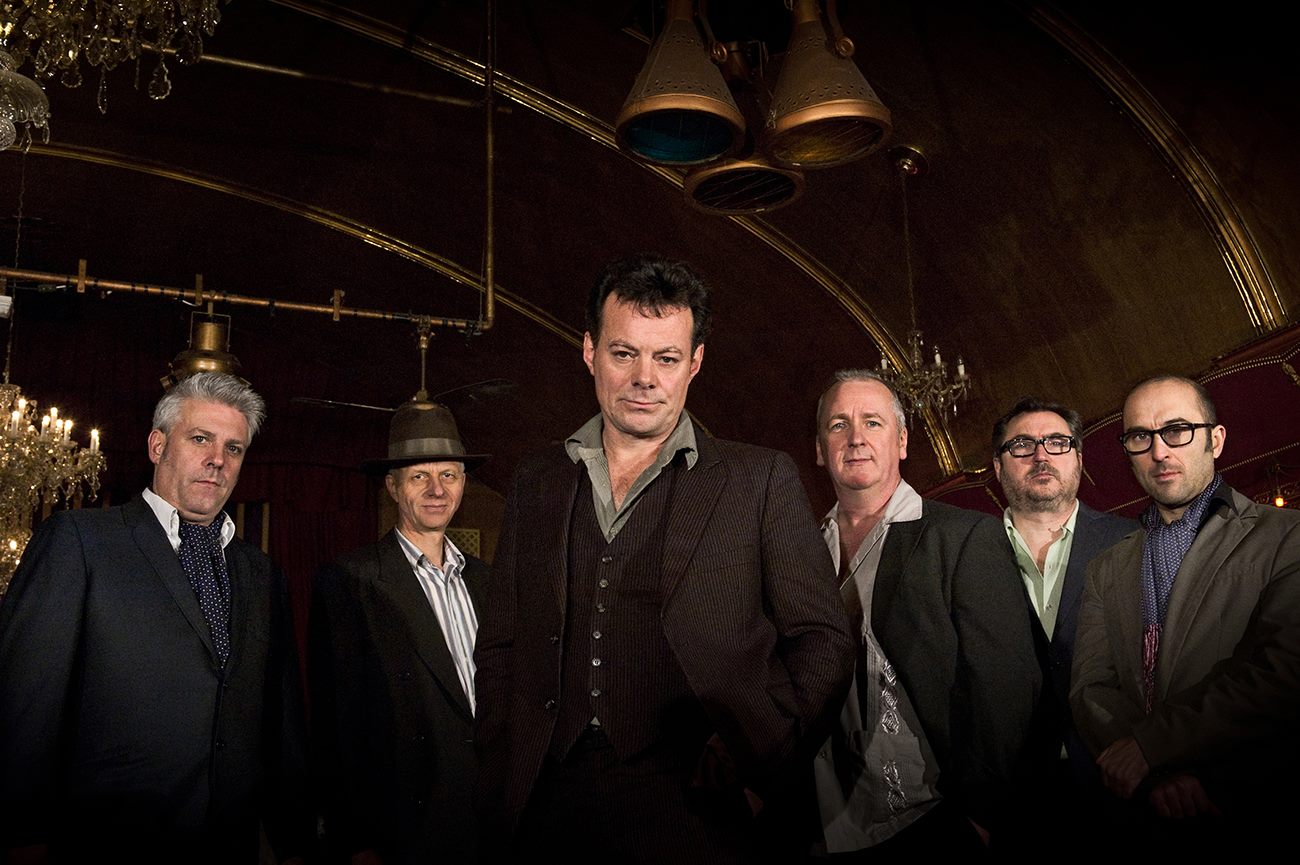
James was born in Essex on a council estate in Colchester, and his family moved to Australia in 1970. James went with them, but came back to the UK two years later, staying in Colchester for 14 years, until he moved to London to get into the music stuff. He left school at 16 and worked in a local furniture store where he lasted a week! On his 17th birthday, he started working for British Rail, which he did for seven years.
A trainee technician, attending college courses, which he says he failed and ended up as Assistant Technician. Working on the safety equipment that prevents signals from allowing two trains to travel on the same line at the same time.
He then focused on his music from the age of 24, and when times were hard in the late 90s, he busked for cash, and rocked up at a recruitment agency, where he got causal work as a labourer, and did his gigs at night; taking on the agency work on low wages for about four years.
…living in a squat…
But after he had recorded, but not yet got a record deal for his breakthrough album, “People Gonna Talk”, James reveals he hit his toughest period financially, and ended up living in a squat in London. “The record was ready, but the managers hadn’t got a bite from any of the companies they had pitched it to.
“Nobody was that keen, as they didn’t think a 40-year-old soul singer was going to have much of a future. But by 2006, we found a deal to put it out and things improved considerably”.
Since then, James and his band have done OK financially, and spend a lot of time in the US where their management and record label are based. Earlier this month, they sold out The Borderline in London for their only UK headline date this year.
As regards leaving it late in his career to “make it”, James is rather glad it did take a while, as he explained. “It never bothers me I didn’t get any notoriety a long time ago, because I don’t really enjoy listening to the stuff I recorded that far back. I wouldn’t have liked my reputation to be resting on stuff I did that long ago. I am still trying to live it down”, he giggles.
He had a clue he was doing something right musically, when he was touring in the US around 2006/7 and while in California, an “affable, lanky 20-something” introduced himself as Oliver Leiber and told James that his Father “loves your voice”. James continues: “I said, wait a minute, that’s a familiar surname. Turns out his Dad was Jerry Leiber, who wrote at least half of Hound Dog. Leiber and Stoller…
“That was absolutely fucking huge. It’s getting the nod from people like that, who have been an influence on me all my life, and people like Alain Toussaint, that makes it worthwhile for me”.
Our audience looked like a lynch mob in deckchairs
The legendary New Orleans singer, pianist, songwriter and producer Alain Toussaint flew over to London, to record with James Hunter and his band, for their 2008 album “The Hard Way,” Alain a big admirer of James’ work. James’ second album to hit the top of the US Billboard blues chart. Rolling Stone called it “unbelievably awesome”.
So, after naming the best moments of his career, how about the worst? He laughs out loud. “We were at the ironically name Freeport in Maine, and we did a gig where our audience looked like a lynch mob in deckchairs. Old ladies sat like they were waiting to watch the guillotine in action.
“The whole town was virtually owned by this couple who had booked us, and it was the most dreadful gig I ever had. People were forbidden to dance. This woman got thrown out of a public place for attempting to dance to what we were doing.
“It’s one of those instances you know you’re in the wrong place and I’ve never been back there since. Ironically, they had a woman signing in sign language, relaying the lyrics of the songs”. We discuss James’ temptation to change those lyrics for her benefit, but he resisted!
So, working with Aretha? “My manager asked me if I’d wait to try to get a photo with Aretha after the gig, and I wasn’t fussed about doing that. It’ll be good for publicity, I am told. So, we waited an hour in a green room, Aretha came in with a face like thunder, and said ‘let’s get on with it!’ The resulting photo had us both sneering at the camera. It wasn’t the greatest moment”.
One legend who has a reputation for being a cantankerous old geezer, is Sir Van Morrison, who James worked with live in the early 90s and on records in 1994 and 1995. Van even sang on one of Mr Hunter’s albums in 1996, the day after he (Van) had appeared with Ray Charles at the Royal Albert Hall.
“We had our various verbal punch-ups, but I always find him disarmingly respectful when I meet him. He’s very nice like that. One of them blokes you don’t see very often, but he’s always pleased to see you”.
James’ ambition is not music related. To make a short feature film. He got the bug when directing the official video to “I Don’t Wanna Be Without You”, the opening track from this new album.
Shot around Brighton, and featuring special guest star, ventriloquist’s dummy character Archie Andrews, a star of radio (yes, I really did say radio!) in the 1950s, in the hit show “Educating Archie”. James and Archie starred in the video, all shot on his prize, spring-wound, 16mm Bolex camera, to get that old-school, vintage look.
As we ended our chat on the ‘phone, swapping the names of artists he and I suggested the other one should check out, James was off to prepare to begin another tour across Europe and the USA.
But, I had to bite my lip NOT to ask him a final, six-million-dollar question about the video. “James. Tell me, which one’s the dummy?” But a listen to “Whatever It Takes”, and it’s loud and clear; this Hunter really is on his game…
By Simon Redley



